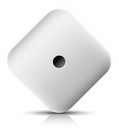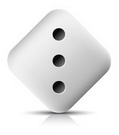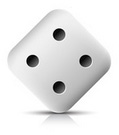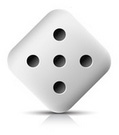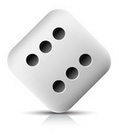Roll a D140 die
D140 Dice Roller
- D140 Dice Roller
- Rolls a D140 die
- Lets you roll multiple dice like 2 D140s, or 3 D140s. Add, remove or set numbers of dice to roll
- Combine with other types of dice (like D138 and D142) to throw and make a custom dice roll
Statistics of this Dice Roller
- RollD140
- Total Kinds of Dice1
- Total Dice1
- Minimum Sum1
- Maximum Sum140
- Lowest Dice Face1
- Highest Dice Face140
- Highest Dice Face of the Smallest Die140
-
D140
Total Possible Combinations 140
Number of combinations are calculated using the formula [ (140+1-1) choose (1) ]
You can try generating all the combinations using the following combination generator
All possible combinations of 1D140 -
D140
Total Possible Permutations 140
Number of permutations are calculated using the formula [ 140^1 ]
You can try generating all the permutations using the following permutations generator
All possible permutations of 1D140
Probabilities of this Dice Roller
D140
Probability of getting a 1
In technical terms this is equivalent of getting atleast one 1. This is close to 0.0071, about 0.71% percent.This is calculated by multiplying all the probabilities of not getting a 1 for each dice and then subtracting the answer from 1.
1 - (139/140)
Probability of not getting a 1
Probability of not getting any 1 is close to 0.99, about 99.29% percent.This is calculated by multiplying all the probabilities of not getting a 1 for each dice.
139/140
Probability of getting all 1's
Probability of getting all 1's is close to 0.0071, about 0.71% percent.
This is calculated by multiplying together all the probabilities of getting a 1 for each dice.
1/140
Probability of getting 1 1s
Probability of getting 1 1's is close to 0.0071, about 0.71% percent.
This is calculated by multiplying together all the probabilities of getting a 1 for each dice that has a 1.
1/140
Probability of getting a 140
In technical terms this is equivalent of getting atleast one 140. This is close to 0.0071, about 0.71% percent.This is calculated by multiplying all the probabilities of not getting a 140 for each dice and then subtracting the answer from 1.
1 - (139/140)
Probability of not getting a 140
Probability of not getting any 140 is close to 0.99, about 99.29% percent.This is calculated by multiplying all the probabilities of not getting a 140 for each dice.
139/140
Probability of getting all 140's
Probability of getting all 140's is close to 0.0071, about 0.71% percent.
This is calculated by multiplying together all the probabilities of getting a 140 for each dice.
1/140
Probability of getting 1 140s
Probability of getting 1 140's is close to 0.0071, about 0.71% percent.
This is calculated by multiplying together all the probabilities of getting a 140 for each dice that has a 140.
1/140
Javascript code to create this dice roller
// code to create a D140 dice roller
// define the range of numbers to pick from
var lowest = 1; // lowest possible side of the dice
var highest = 140; // highest possible side of the dice
var numbers_of_dice = 1; // how many dice to roll
var this_roll = []; // array to store the results of this roll
for (var j = 1; j <= numbers_of_dice; j++) {
// loop for the number of dice
// for each dice, generate a number between lowest and highest
var dice_face = Math.floor(Math.random() * (highest-lowest+1) + lowest);
this_roll.push(dice_face); //store this in the array
}
// print all the generated rolls
for (j = 0; j < this_roll.length; j++) {
// loop through the dice array
//print each dice roll value followed by a space
document.write(this_roll[j]);
document.write(" ");
}
/*
Sample output
*/
